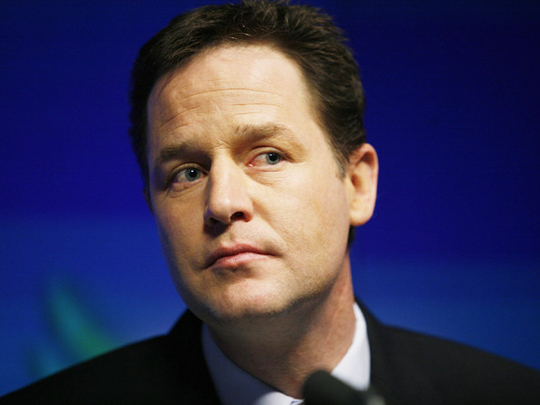
It wasn't just the holding of the first live TV election debates that shocked the UK, but also the outcome. Nick Clegg gave what might turn out to be the performance of his career and the opinion polls reflected this.
What made him stand out? Perhaps it was because a Liberal Democrat leader had never had the opportunity to take on Labour and the Conservatives on such a platform before. Agreed, Labour and the Tories have Prime Minister's Questions to battle it out, but a measured, balanced debate where each of the three main party leaders are given a turn to speak? It just hadn't happened before.
Admittedly, just 15 minutes into the 90-minute debate, the leaders did start to speak over one another, but they were strictly reprimanded by the moderator. With audience applause banned, it turned out that the first of three weekly debates was actually more strictly moderated than House of Commons' debates.
As a third party, the Lib Dems are sometimes perceived as ‘hangers-on' in the political sphere, with government control firmly in the hands of Labour and the Tories for the past 65 years.
One thing that deters voters from supporting the ‘yellows' is that they haven't any experience of the day-to-day, nitty-gritty operations that are needed to run the UK.
During the first debate, Clegg had a massive advantage; in fact a couple of massive advantages. The Lib Dems are often Labour's ‘back-up', used as an ally to fight off the Tories. Where that might work for Labour in the House of Commons, it certainly didn't work in a moderated debate, where each party was given the opportunity to give responses.
Perhaps the most memorable and embarrassing example of this, was when Gordon Brown sought support on the reformation of the House of Lords from Clegg.
"Nick agrees with me," Brown stated. Clegg responded that Labour had had 13 years to take action, but hadn't, and the only thing he supported on this issue were his own policies.
"The truth is that you do support me," Brown insisted, much to the delight of Cameron.
Oh dear, the loyal support of the Lib Dems suddenly evaporated in front of the prime minister's eyes. Maybe this was because it was the first time the ‘third' party had had the opportunity to respond directly to such statements.
Ganging up on Cameron didn't work this time.
The other huge advantage Clegg had was the ability to make the Lib Dems look like a welcome break from the reds and the blues, in front of 10 million ITV viewers.
"I don't know about you," Clegg said to the audience with all seriousness, "but the more they attack each other, the more they sound the same."
Clegg isn't perhaps as charismatic as Paddy Ashdown, who exuded energy from every pore, but he certainly isn't as drab as John Major.
Of course die-hard Labour and Tory supporters still don't see Clegg as a real threat, despite what the opinion polls say about the first debate. Labourites are saying that Brown is still the only one with any concrete solutions to the UK's problems — the recession, tax, immigration, a failing, underfunded health system — while Tories insist that the Conservatives are the only ones that can sort out the government's "mess".
So what of the Lib Dems? I'm sure they're very excited. Opportunity, positive viewer response and another two live debates with which to prove themselves — it must feel like the glass ceiling of dominant party power has been smashed into smithereens.
And so the live debates are likely to provoke the greatest Lib Dem support for years; depending on the outcome of the two remaining contests. While the Lib Dems still may not actually manage to win the election on May 6, I'm certain that they'll come out of it with more votes and more seats than ever before.
Although the Lib Dems only won 17 per cent of the national vote in the 1997 general elections, they more than doubled their seats to 46. More gains were made in the 2001 and 2005 elections. Are they a force to be reckoned with? Probably not yet. But perhaps for the first time, this election will be a three-horse race.








